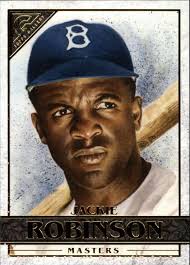Jackie Robinson: Breaking Barriers in Baseball and Beyond

Introduction
Jackie Robinson, an iconic figure in American history, holds a significant place in both sports and civil rights. Known as the first African American to play Major League Baseball (MLB) in the modern era, Robinson’s career began with the Brooklyn Dodgers in 1947, a moment that served as a catalyst for change in the deeply segregated sport.
The Impact of Jackie Robinson
Robinson’s debut on April 15, 1947, is more than just a notable date in sports history; it symbolizes the breaking of racial barriers in America. Before Robinson, the color line in MLB had kept African American athletes from competing at the highest level, denying them opportunities based solely on the color of their skin. Robinson’s arrival shattered this barrier, finishing the season with a batting average of .297, leading the Dodgers to six pennants and a World Series championship.
Robinson faced intense racism and hostility both on and off the field, yet he remained resilient. His strength and poise under pressure not only won him the 1947 Rookie of the Year award but also earned him the respect of his peers, changing minds and hearts within the league. He was a vital figure in the broader civil rights movement, setting an example for perseverance and advocacy against racial injustice.
Legacy and Recognition
Jackie Robinson’s influence extends past the baseball diamond. In 1962, he was inducted into the Baseball Hall of Fame, and his number ’42’ has since been retired across all of Major League Baseball as a testament to his impact on the sport. Every year, on April 15, MLB celebrates Jackie Robinson Day, a day for all players to wear his number in tribute to his legacy.
Robinson’s story continues to inspire new generations, reminding us of the power of resilience and the importance of equity and inclusion. His legacy also serves as an ongoing call to address issues of racial inequality present in sports and society today.
Conclusion
Jackie Robinson was not just a baseball player; he was a pioneer who paved the way for countless athletes of color to succeed in sports and beyond. As we commemorate his remarkable journey, it’s vital to recognize that his achievements resonate far beyond the baseball field and continue to affect the ongoing dialogue around race and equality in sports and America. The lessons learned from Robinson’s life remain important as society strives for justice and equality.









